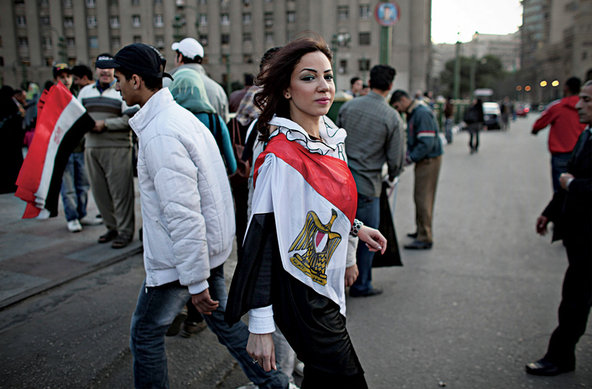Prada And a Head Scarf, I Like It!
CAIRO: One of my “liberal’ male friends once asked me why I’m still wearing this “stupid piece of cloth” pointing to my headscarf, and my response was I’m still wearing it to continue disturbing people like him!
This was not the first time I heard such a comment. I was a 17 years old girl when I first entered the American University in Cairo (AUC), Egypt’s most prestigious university where the country’s cream of the society go for education. I was the rural veiled student who came from a middle class family with a full student scholarship, wearing my headscarf and relatively more conservative dress code than the rest of the community.
I remember the comments about my hijab, and I remember when I was told that rural students with scholarships were easily identified on campus just because of the wide jeans they wear. I remembered when I was told that I have to wear skinny jeans in order not to be identified. I remember my attempts to conform.
Ten years later, I confess that I pretty much changed my dress code. I wear skinny jeans and I try to afford wearing Prada and Gucci. But I still stick to my headscarf. Aside from my strong belief in the religious duty of wearing “this piece of cloth”, sticking to it could be my last proof that I still did not fully conform.
Other women in my country, many of whom are very close friends, decided to take off “this piece of cloth” also as an attempt to not fully conform to the standards of their more conservative circles.
I live in a country where any woman will be judged for whatever dress code she chooses to wear. Veiled women are oppressed and ashamed of their femininity according to liberals, those who wear the full face veil are labeled as terrorists and extremists, while those who don’t wear headscarves or decided to take them off are whores in the eyes of conservatives.
In my country, like in any other country of this miserable part of the world, it is enough to be a woman to be judged. Liberals and Islamists alike judge women based on their dress code.
While 99% of Egyptian women said in a UN survey that they experienced sexual harassment in Egypt, and I never heard Egyptian men strongly condemning this endemic practice as much as they strongly debated the issue of women's “ideal” dress code. I hear too much of “what women should wear” and I hear too little about their freedom of choice.
Everyday I see friends sharing old photos of Egyptian women in the 1950s and 1960s, with elegant short dresses and nice haircuts, as they mourn the good old days when Egyptian women looked good. For many “liberal” Egyptians, this was the era were Egyptian women were truly free. And I wondered if they ever questioned the mortality rates among pregnant women at this time, or how many women received higher education, or how many female members were in the parliament. Is less clothes an indication of freedom? Is more clothes an indication of virtue?
Did Egyptian women truly experience the freedom of choice that enabled reject wearing the headscarf? Did they have the freedom now to wear it? Were we ever able to have the liberty to decide what to do with our looks, with our bodies and future? I strongly doubt.
For five years, I lived in a country swept by a severe political turmoil, where the question of Egypt’s identity was the most debated issue. Is Egypt Islamic or secular? And hence should women wear the scarf or take it off. As this identity battle continued, thousands of young people in this country died, and the question is yet to be answered.
But after five years, I realized that this debate has no place in the Egypt I dream of. In my Egypt, people will be left to decide their identity, hence their religion and dress code by their own. In the Egypt of my dreams, women will have the right to freely choose what they do with the dress codes, their future and their bodies. In the Egypt of my dreams, Egyptians will realize how diverse they are, and will see the strength of being diverse and different.
Till this day comes, I will continue dreaming of my own Egypt, and will send my salute and love for every single woman out there freely celebrating her femininity and identity the way she likes it.
(Mai graduated from the American University in Cairo with a degree in journalism. She worked mostly for local English-language news outlets but has also been writing in Arabic, particularly when it comes to her home city, Aswan, Upper Egypt. She covers a variety of issues, but is drawn to the student movement, campus politics, human rights journalism among other things.)





